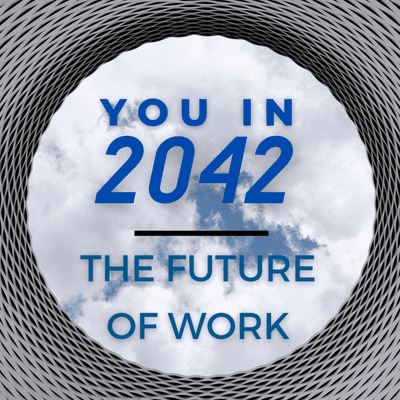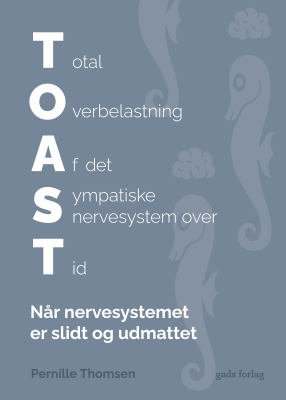
You in 2042 ... The Future of Work
engelsk
Business
Begrænset tilbud
2 måneder kun 19 kr.
Derefter 99 kr. / månedOpsig når som helst.
- 20 lydbogstimer pr. måned
- Podcasts kun på Podimo
- Gratis podcasts
Læs mere You in 2042 ... The Future of Work
Glimpse into the future with thought provoking insights from global thought leaders. Imagine yourself in 2042 with the work world transformed around you. Get ready for this future now!
Alle episoder
64 episoderBeyond Automation: Human Skills in Action
Lorne Novolker, co-founded Prospero Learning and a seasoned leader in talent development and digital transformation, shares how organizations can navigate workforce change in an AI-accelerated world. From putting strategy before software to integrating AI into core talent decisions, he explains why this moment requires thoughtful leadership—not fear-driven reactions. Tune in to hear his perspective on human differentiators like empathy and judgment, the shift from task-based work to decision-based roles, and the critical debate between skills-first and AI-first strategies. Connect with Lorne at novolker.com [https://www.novolker.com/]or on LinkedIn [https://www.linkedin.com/in/lorne-novolker/]. Show Notes [00:01] Introduction to Lorne NovolkerLorne Novolker is a seasoned leader in learning, talent development, and digital transformation. He co-founded Prospero Learning and was a former executive at GP Strategies and Calian Learning. He now advises organizations on AI-driven talent strategy and EdTech innovation, helping leaders navigate workforce transformation in an AI-accelerated world. [02:02] AI and the Crossroads of Talent StrategyHe describes this moment as both exciting and unsettling, emphasizing that AI must move beyond IT and into core talent strategy. Organizations need to rethink how they recruit, develop, and lead in a way that integrates AI without creating fear. [03:43] Strategy Before SoftwareLorne stresses that AI implementation requires strategic thinking—not just software deployment. The real opportunity lies in integrating AI with human capability, not treating it as a standalone technical solution. [05:07] Lessons from Past Digital TransformationsDrawing parallels to the fax machine, email, and social media, he reflects on how each wave of technology reshaped work. These past evolutions offer important lessons for how we approach AI’s rapid acceleration today. [05:50] Human Differentiators as Premium SkillsHe emphasizes that empathy, critical thinking, context, and judgment will become even more valuable. Rather than competing with AI, humans must complement it by focusing on uniquely human strengths. [07:33] From Task-Based Work to Decision-Based RolesLorne explains that work is shifting away from repetitive tasks toward decision-making and critical thinking. Judgment, in particular, becomes a defining capability in the AI-enabled workplace. [08:50] Learning Faster Than the Pace of DisruptionWith AI accelerating change, he underscores that thriving will depend on the ability to learn faster than disruption unfolds. [09:36] The Cost-Cutting TrapHe identifies a major pitfall: organizations focusing primarily on cost savings rather than long-term value creation. This mindset fuels workforce fear instead of innovation. [11:30] The Skills-First or AI-First DebateLorne outlines the strategic dilemma many organizations face: Should they build a strong skills architecture first and layer AI on top? Deploy AI rapidly and adapt skills later? Or attempt both in parallel? The approach taken will significantly shape future outcomes. [13:04] Connect with Lorne NovolkerHe invites listeners to connect via LinkedIn [https://www.linkedin.com/in/lorne-novolker/] or visit novolker.com [https://www.novolker.com/] to continue exploring how AI and talent strategy can evolve responsibly and effectively.
Beyond the Degree: Future-Proofing Students for 2042
Emily Coleman, Co-Founder and CEO of a higher education data analytics company, shares how colleges can prepare students for the jobs of 2042. She explains how predictive modeling informs enrollment, retention, and student success, why adaptability is critical in higher education, and how alternative degree models and data literacy can future-proof graduates. Learn practical insights on using data, nimble strategies, and innovative learning models to help students—and institutions—thrive. Connect with Emily at haianalytics.com or on LinkedIn @EmilyColeman [https://www.linkedin.com/in/emily-chase-coleman-95062779/]. Show Notes [00:26] Introducing Emily Coleman Emily Coleman is the Co-Founder and CEO of a data analytics company serving higher education. With over 23 years in the field, she and her team build predictive models for “admit-to-enroll yields, retention, and student success,” helping institutions make more informed decisions. [01:04] Preparing Students for 2042 Jobs Emily notes that while data science and AI programs are important, the larger issue for colleges and universities is adaptability. She explains that higher education struggles to “shift strategy around to meet new needs” due to its structure—tenured faculty, physical campuses, and long-standing systems. Institutions that learn how to be more nimble, she says, will be the ones that succeed. [02:18] Why Data-Driven Decision Making Matters Emily reflects on how far higher education has come, explaining that when she started her career, a data-driven strategy wasn’t widely embraced. Today, “almost every job has some sort of data component,” even if individuals aren’t directly working with the data themselves. [03:37] Predictive Modeling in Higher Education She describes how universities rely on predictive modeling to support enrollment goals that go beyond headcount and revenue. Schools use data to balance program needs, geographic and ethnic diversity, and limited financial aid—while also examining retention and student satisfaction. Data, she says, now works alongside experience and intuition to confirm or challenge assumptions. [03:54] Data Literacy and Job Readiness Emily explains that most students now graduate with some exposure to data or statistics. While not every career requires great technical skills, she believes understanding how data informs decisions helps graduates be “better off” in a workforce where data is used across industries. [05:03] Rethinking the Traditional Degree Model As more students question the value of a four-year residential degree, Emily emphasizes the need for alternative learning models. She points out that “everyone coming for four years” is no longer practical, especially for working adults, parents, and non-traditional students. Institutions that meet learners where they are will be more sustainable long-term. [06:34] Accelerated Degrees and Return on InvestmentEmily highlights the growing use of accelerated degree programs, noting that saving even a year of tuition can make a significant difference—while still keeping job outcomes and future-ready skills in focus. [09:07] Where to Learn MoreEmily invites listeners to connect with her on LinkedIn or visit her company’s website at haianalytics.com to learn more about her work in higher education and data analytics.
The Inclusive Era: Where Leadership Meets Humanity
Desiree Goldey, Founder of Do Better Consulting, shares real talk about the future of work, shaped by empathy, authenticity, and people-first leadership. She dives into the evolution of DEI and the crucial role middle managers play in creating lasting change. Tune in for bold insights and connect with Desiree at dobetterconsulting.net [https://www.dobetterconsulting.net/] or LinkedIn [https://www.linkedin.com/in/desireegoldey/]. Show Notes [0:30] Introducing Desiree Goldie Desiree Goldie, Director of Marketing and Culture at ZRG Partners. With roots in hospitality, she transitioned into the talent space in 2015 to champion DEI, eventually expanding her expertise across recruiting, operations, analytics, and marketing. [2:05] Shifting to a People-Centered Future Desiree shares her perspective on how the world of work is evolving. She sees a move away from company-centric mindsets toward a stronger focus on people. As we head toward 2042, empathy, inclusion, and belonging will be essential for organizational success, regardless of what labels are used. [3:47] The Evolution of DEI and Leadership Desiree reflects on the surge of DEI initiatives in 2020, noting that while momentum grew, many efforts lacked depth. Organizations often prioritize representation without fostering true inclusion and belonging. As we move forward, she emphasizes the need for intentional strategy and training, especially for leaders and middle managers, to create genuinely inclusive environments by 2042. [6:43] Empathy and Authenticity as Strategy Desiree highlights empathy and authenticity as powerful leadership tools. Leaders who show vulnerability and genuinely support their teams can instantly transform workplace dynamics. She stresses that while empathy may come naturally in personal life, applying it at work is a different skill—one that must be intentionally taught and nurtured. [8:25] The Power of Being Human Desiree emphasizes the importance of simply being human in interactions. She argues that if leaders approach others with empathy and authenticity, not just for the sake of metrics or profits, the world and workplaces would undergo a significant transformation. She advocates for the correlation between empathy, authenticity, and success, believing it can drive both positive societal and organizational change. [9:07] Connecting with Desiree You can follow Desiree on LinkedIn [https://www.linkedin.com/in/desireegoldey/], where she actively shares insights and connects with her community. Visit dobetterconsulting.net [https://dobetterconsulting.net] to learn more and join her newsletter. She’s also on BlueSky under the handle @dobetter.
Building the Human Edge in a High-Velocity Future
Tara Chklovski, former aerospace engineer and CEO of Technovation, breaks down what it takes to thrive in a future shaped by rapid AI growth. From “durable human skills” to managing cognitive load, she shares how to stay relevant, confident, and creative as technology accelerates. Gain practical insights on building technical confidence, navigating uncertainty, and preparing yourself—and the next generation—for a world where anyone can create, lead, and solve meaningful problems. Connect with Tara at Technovation.org [https://www.technovation.org/] or on LinkedIn @TaraChklovski [https://www.linkedin.com/in/tarachk/]. Show Notes: [00:12] Introducing Tara Chklovski Tara Chklovski, former aerospace engineer and CEO of Technovation, leads the world’s largest AI accelerator. She reflects on the rapid pace of change as we look 17 years ahead. [00:57] Rethinking How We Predict the Future Tara shares why predicting 2042 is difficult, noting how unpredictable the past 17 years have been. She recalls Technovation’s early innovations—from mobile app education shortly after the iPhone’s release to publishing curriculum on MOOCs—reminding us that the lead time for staying ahead keeps shrinking. [02:10] Humans and AI: A Growing Collaboration Tara sees human–AI collaboration accelerating, sharing an example of a pastor in Kenya using ChatGPT for weekly sermons. It’s one sign of how quickly AI is integrating into everyday life. [02:40] Beyond Prompt Engineering: Building Durable Human Skills She highlights the “durable human skills” needed in an AI-driven world—creativity, empathy, and problem-solving—and previews an upcoming Oxford workshop focused on these capabilities. [03:00] Solving the Hard Problems Together As simpler issues get solved, Tara notes we’re left with complex, human-centered challenges like inequality and suffering. AI can help address them, but only if people shift toward purpose-driven, collective problem-solving. [04:00] Skills for 2042: Data, Design, and Decision-Making Tara points to rapid prototyping, data science, and analytical thinking as core future skills. With abundant knowledge at our fingertips, people can create and lead more than ever—if they’re ready to make bold decisions. [05:18] Empowering the Next Generation She believes technology and entrepreneurship will remain essential. Future teams will operate faster, smaller, and globally, achieving impact with fewer resources. [05:39] The Bottleneck of Cognitive Load Tara warns that while tech accelerates, human cognitive limits don’t. Managing cognitive load will be a major challenge as problems and workdays grow more complex. [06:09] Resilience as a Core Skill She emphasizes resilience and cognitive load management as key leadership skills. Tara urges integrating coping strategies into education to prepare future leaders. [07:10] Why Technical Learning and Self-Efficacy Matter Most Now Tara stresses cognitive problem-solving and self-efficacy as essential. Staying relevant means embracing discomfort, learning new skills, and practicing technical problem-solving daily. She encourages everyone—even beginners—to build simple coding projects to expand their confidence and adaptability. [09:45] Blurring Work-Life Boundaries for Growth She challenges traditional work-life balance, suggesting deeper integration helps individuals continue learning while tackling big problems. [10:10] From Passive Consumption to Active Creation Tara notes how much time is spent on passive consumption and urges shifting toward making and building instead. [10:50] Making Small, Intentional Shifts Even replacing a small portion of passive habits with simple technical projects can improve problem-solving and confidence. [11:12] Where to Find Tara’s Work and Wisdom Tara invites listeners to explore Technovation.org [https://www.technovation.org/] , where her organization empowers girls globally to solve real-world problems with technology. She also encourages people to volunteer or judge student submissions, and to follow her on LinkedIn [https://www.linkedin.com/in/tarachk/] for practical insights and learning tips. [https://www.technovation.org/]
Embrace Change, Own the Future
Chris Dyer, a workplace strategist, examines how organizations can thrive amid rapid technological change. He discusses the need for clear goals, continuous learning, and workforce adaptability to ensure AI and automation enhance productivity rather than create barriers. Chris shares practical insights on how leaders and employees can embrace new technologies, stay relevant, and foster a culture of growth in an evolving digital landscape. Explore how workplace culture and technology shape the future of work. Gain actionable strategies to adapt, lead, and thrive. Connect with Chris Dyer on LinkedIn [https://www.linkedin.com/in/chrisdyer7/] and learn more at ChrisDyer.com [http://ChrisDyer.com]. Show Notes [00:26] Introduction to Chris Dyer Chris Dyer, a retired CEO and leadership speaker, shares his expertise in workplace culture and how to make work more engaging while preparing for the future. [01:05] The Acceleration of Change Chris Dyer explains how technological cycles are becoming shorter, accelerating the pace of change in the workplace. While previous generations experienced one major shift in their lifetime, today's workforce navigates multiple transformations, from the rise of the internet to AI and the Internet of Things. He emphasizes the need for adaptability, urging leaders to embrace change rather than resist it. [03:06] The Cultural Impact of Rapid Change He discusses how the fast pace of change could disrupt societal and workplace culture. Without shared beliefs or a common language, organizations risk losing their foundational identity. He illustrates this with a personal anecdote, questioning whether future generations will even need to learn how to drive as autonomous technology advances. This shift, he warns, could redefine not just work but fundamental aspects of human experience. [04:40] The Workplace Challenge of Keeping Up with Change Chris Dyer highlights the growing gap between institutional knowledge and technological fluency. He compares it to the frustration of teaching older generations how to use new devices, warning that employees who struggle to adapt may become a burden rather than an asset. To bridge this divide, he predicts a resurgence in workplace training, where companies must take an active role in educating employees on emerging technologies like AI to maintain efficiency and competitiveness. [07:07] The Key to Future-Proofing the Workforce He emphasizes that companies must first clarify what they want to achieve with new technologies and why it's important before getting caught up in the how. Many organizations struggle with implementation details instead of focusing on clear objectives, automation priorities, and employee benefits. He points out that simply introducing AI or software without explanation leads to confusion and missed opportunities. To succeed, companies must ensure employees understand the purpose of new tools, provide proper training, and secure buy-in to drive meaningful adoption. [09:00] How Individuals Can Stay Future-Ready Chris Dyer encourages individuals to take initiative in learning about AI and emerging technologies. With many free resources available, employees at any skill level can start building their understanding. He emphasizes that you don’t need to be an expert in the technical details, but having enough knowledge to explain the why and what’s possible will make you a valuable asset in the workplace. Rather than fearing AI, employees should embrace it as a tool that simplifies tasks—not something that requires coding expertise. Danielle Wallace reinforces that developing basic skills ensures individuals stay relevant amid constant change [10:30] Where to Connect with Chris Dyer To learn more about Chris Dyer, he is active on TikTok [https://www.tiktok.com/@chrisdyer.com], and LinkedIn [https://www.linkedin.com/in/chrisdyer7/]. For more in-depth content, he recommends visiting his website, ChrisDyer.com [http://chrisdyer.com/], where he shares blog articles and other resources.
Vælg dit abonnement
Begrænset tilbud
Premium
20 timers lydbøger
Podcasts kun på Podimo
Gratis podcasts
Opsig når som helst
2 måneder kun 19 kr.
Derefter 99 kr. / måned
Premium Plus
100 timers lydbøger
Podcasts kun på Podimo
Gratis podcasts
Opsig når som helst
Prøv gratis i 7 dage
Derefter 129 kr. / måned
2 måneder kun 19 kr. Derefter 99 kr. / måned. Opsig når som helst.















































